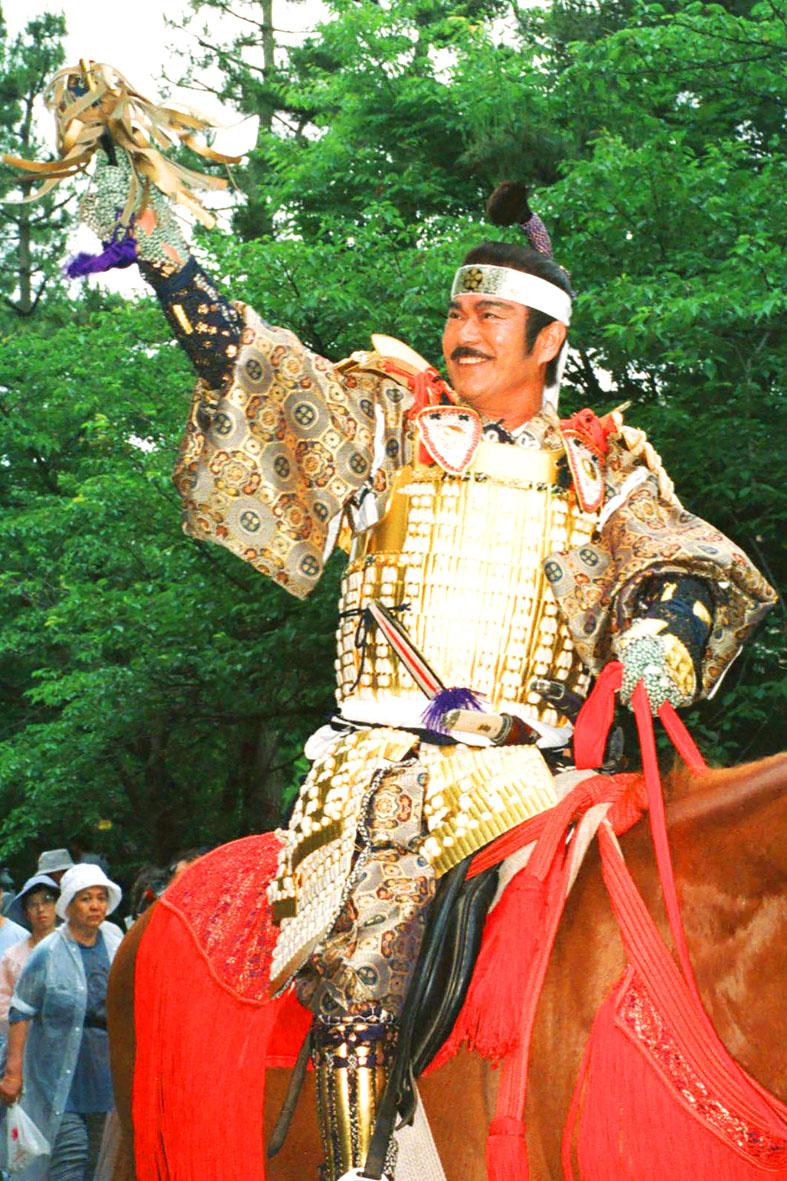Japanese actor Sonny Chiba, who wowed the world with his martial arts skills in more than 100 films, including Kill Bill, has died. He was 82.
Chiba, known in Japan as Shinichi Chiba, died late on Thursday in a hospital near Tokyo, where he had been treated for COVID-19 since Aug. 8, Tokyo-based Astraia, his management office, said in a statement yesterday.
It said he had not been vaccinated.

Photo: AP
Chiba rose to stardom in Japan in the 1960s, portraying samurai, fighters and police detectives, the anguished so-called “anti-heroes” trying to survive in a violent world. He did many of the stunt scenes himself.
His overseas career took off after his 1970s Japanese film The Street Fighter proved popular in the US.
American director Quentin Tarantino listed the work as among his “grindhouse,” or low-budget kitsch cinema, favorites. Tarantino cast Chiba in the role of Hattori Hanzo, a master swordsmith in Kill Bill.
Chiba appeared in the 1991 Hollywood film Aces, directed by John Glen, as well as in Hong Kong movies.
Chiba’s career also received a boost from the global boom in kung fu films, set off by Chinese legend Bruce Lee (李小龍), although critics say Chiba tended to exhibit a dirtier, thug-like fighting style than Lee.
“A true action legend. Your films are eternal and your energy an inspiration. #SonnyChiba #RIP,” American actor Lewis Tan wrote on Twitter.
New York-based writer and director Ted Geoghegan called him “the great Sonny Chiba.”
“Watch one of his films today,” Geoghegan wrote on Twitter, followed by images of a fist and a broken heart.
Born in Fukuoka, southwestern Japan, Chiba studied at Nippon Sport Science University and trained in various martials arts, earning a fourth-degree black belt in karate.
Chiba is survived by his three children, Juri Manase, Mackenyu Arata and Gordon Maeda, all actors.

ANGER: Unrest worsened after a taxi driver was killed by a police vehicle on Thursday, as protesters set alight government buildings across the nation Protests worsened overnight across major cities of Indonesia, far beyond the capital, Jakarta, as demonstrators defied Indonesian President Prabowo Subianto’s call for calm. The most serious unrest was seen in the eastern city of Makassar, while protests also unfolded in Bandung, Surabaya, Solo and Yogyakarta. By yesterday morning, crowds had dispersed in Jakarta. Troops patrolled the streets with tactical vehicles and helped civilians clear trash, although smoke was still rising in various protest sites. Three people died and five were injured in Makassar when protesters set fire to the regional parliament building during a plenary session on Friday evening, according to

Australia has announced an agreement with the tiny Pacific nation Nauru enabling it to send hundreds of immigrants to the barren island. The deal affects more than 220 immigrants in Australia, including some convicted of serious crimes. Australian Minister of Home Affairs Tony Burke signed the memorandum of understanding on a visit to Nauru, the government said in a statement on Friday. “It contains undertakings for the proper treatment and long-term residence of people who have no legal right to stay in Australia, to be received in Nauru,” it said. “Australia will provide funding to underpin this arrangement and support Nauru’s long-term economic

‘NEO-NAZIS’: A minister described the rally as ‘spreading hate’ and ‘dividing our communities,’ adding that it had been organized and promoted by far-right groups Thousands of Australians joined anti-immigration rallies across the country yesterday that the center-left government condemned, saying they sought to spread hate and were linked to neo-Nazis. “March for Australia” rallies against immigration were held in Sydney, and other state capitals and regional centers, according to the group’s Web site. “Mass migration has torn at the bonds that held our communities together,” the Web site said. The group posted on X on Saturday that the rallies aimed to do “what the mainstream politicians never have the courage to do: demand an end to mass immigration.” The group also said it was concerned about culture,

Philippine President Ferdinand Marcos Jr has fired his national police chief, who gained attention for leading the separate arrests of former Philippine president Rodrigo Duterte on orders of the International Criminal Court and televangelist Apollo Carreon Quiboloy, who is on the FBI’s most-wanted list for alleged child sex trafficking. Philippine Executive Secretary Lucas Bersamin did not cite a reason for the removal of General Nicolas Torre as head of the 232,000-member national police force, a position he was appointed to by Marcos in May and which he would have held until 2027. He was replaced by another senior police general, Jose